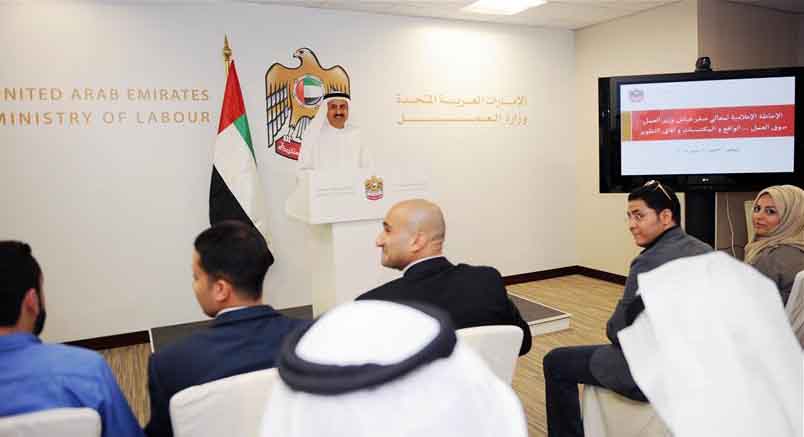ID :
326706
Tue, 04/29/2014 - 09:42
Auther :
Shortlink :
https://www.oananews.org//node/326706
The shortlink copeid
UAE Labour Minister hints at second phase in WPS during MoL's strategy briefing

During a media briefing on the Ministry of Labour's applied strategies for 2013, as well as the upcoming ones in 2014-2016, Saqr Ghobash, Minister of Labour, highlighted major achievements and prospects of development within the labour market that the Ministry has achieved over the past year.
He said during the briefing, that, "The Labour market adapted systems and policies, and has laid the foundations of its stability, creating a balance in work-related relationships between parties of production, not forgetting the proper guidance of our nations wise leadership." The Minister pointed out operational initiatives that the ministry is working on to achieve a set of strategic objectives, most notably in the development of systems and mechanisms that contribute to labour disputes, transparency and quick response. In addition to the launch of the second phase of the Wage Protection System (WPS), which will mainly focus on developing systematic technicalities that ensure salary payments through ATM machines instead of the currently used cash receiving mechanism.
Minister Ghobash pointed out that the Ministry is currently working on raising the level of customer service quality to meet the requirements of smart government strategies.
"I'd like to point out that despite the latest global financial crisis, the UAE's labour market was very stable with a slight change in the numbers of the total number of labourers, remarkably, the year 2010 recorded the highest decrease of 4.7 percent, but the total number has remained within the average during the past six years and the number of labour cards issued last year was around 4.027 million, while the number of establishments registered with the Ministry during the same period was over 297,461" Ghobash said.
He also added that the total number of employees registered with the WPS was over 3.2 million from the total number of registered workers within the Ministry's data base in 2013. He confirmed that the total number of establishments registered in the system are around 84 percent of the total number. The Labour Minister stressed that companies not registered in the WPS system will not be granted any labour cards permission, saying that the matter is very simple yet with great valued importance to employees as it protects their simplest labour requirement, "Get a salary by the end of the month".
The Minister has also mentioned referring around 2,028 companies to the public prosecution during the past three years for violating labour laws and regulations. Of which, 349 facilities did not comply with labour wage payments, 1027 with fake working relationships between the owners and workers, and 305 facilities let their labourers work for others. In addition, 321 other facilities have used illegal workers in their facilities, 21 recruitment agencies were found guilty of committing irregularities and five facilities that provided the ministry with fake documents.
Ghobash said, "The stability of the labour market is reflected within the remarkable decline in the number of facilities being stopped since operating the WPS system in 2009." During the media briefing, he reviewed the relevant Ministry records regarding the decrease in practice stoppage as follows: in 2008, 121 facilities were ordered to stop their practices. In 2009 the number fell to 104 cases, while in 2010 there were 81 cases, in 2011 there were 73 cases, in 2012 the number of cases fell to 67 and 2013 witnessed just 56 cases, that were mostly due to a higher wages demand.
The Minister continued, "The labour transmission system is very transparent and made much easier compared to previous years, as is it based on an agreement between the owner and the worker to allow the latter to join another facility without any problems. In order to avoid bans, the worker is obliged to complete two years with the company he currently works for to be able to ask for a transfer. However, the worker can leave before completing two years if the owner doesn't abide by labour laws and doesn't provide a monthly salary." There are some exceptions that excluded workers from the two year completion requirement to join a new job. If they acquire First Skill levels with minimum salaries of about Dh12,000, Second Skill levels with not less than Dh7000 or Third Skill level making around Dh5000.
Ghobash pointed out that the Ministry issued about 62,178 transfer permits in 2011, in 2012 around 59,876 permits were issued and in 2013, the Ministry issued 72,059 permissions.
The Minister mentioned that the upcoming strategies for the period 2014-2016 will mainly focus on employing national cadres in the labour market, especially in the private sector, stating that ‘Tas'heel' customer service centres are a great example.
"There are around 35 centres across the UAE, employing around 1,000 UAE nationals. These centres are private companies that abide to MoL laws and regulations in managing customer services, leaving the 1,200 Ministry employees to focus on the actual labour monitoring issues which ensures proper labour market stability." He explained that the Ministry is always keen on participating in labour awareness campaigns, saying that the MoL has organised and participated in over 900 awareness workshops.
Towards the end, Minister Ghobash thanked the media representatives for attending the briefing, saying that it is very important to connect with the media to send the right messages and always look at the media representatives as "true friends and allies." – Emirates News Agency, WAM





